BMP4002 Business Law: Examining the Legal System for Business
VerifiedAdded on 2023/06/12
|10
|2793
|147
Report
AI Summary
This report provides a detailed analysis of the UK legal system for business, focusing on various classifications of law, sources of law, and employment law. It begins by defining laws and identifying the legal systems in the UK, followed by an explanation of civil and criminal law, along with the roles of the High Court and Supreme Court. The report then explores case law and legislation as sources of law, including delegated legislation. Finally, it delves into the UK law-making process, specifically focusing on employment law, statutory duties of employers, and wrongful and unfair dismissal actions. This comprehensive overview aims to provide a thorough understanding of the legal framework governing business operations in the United Kingdom. Desklib provides solved assignments and past papers for students.
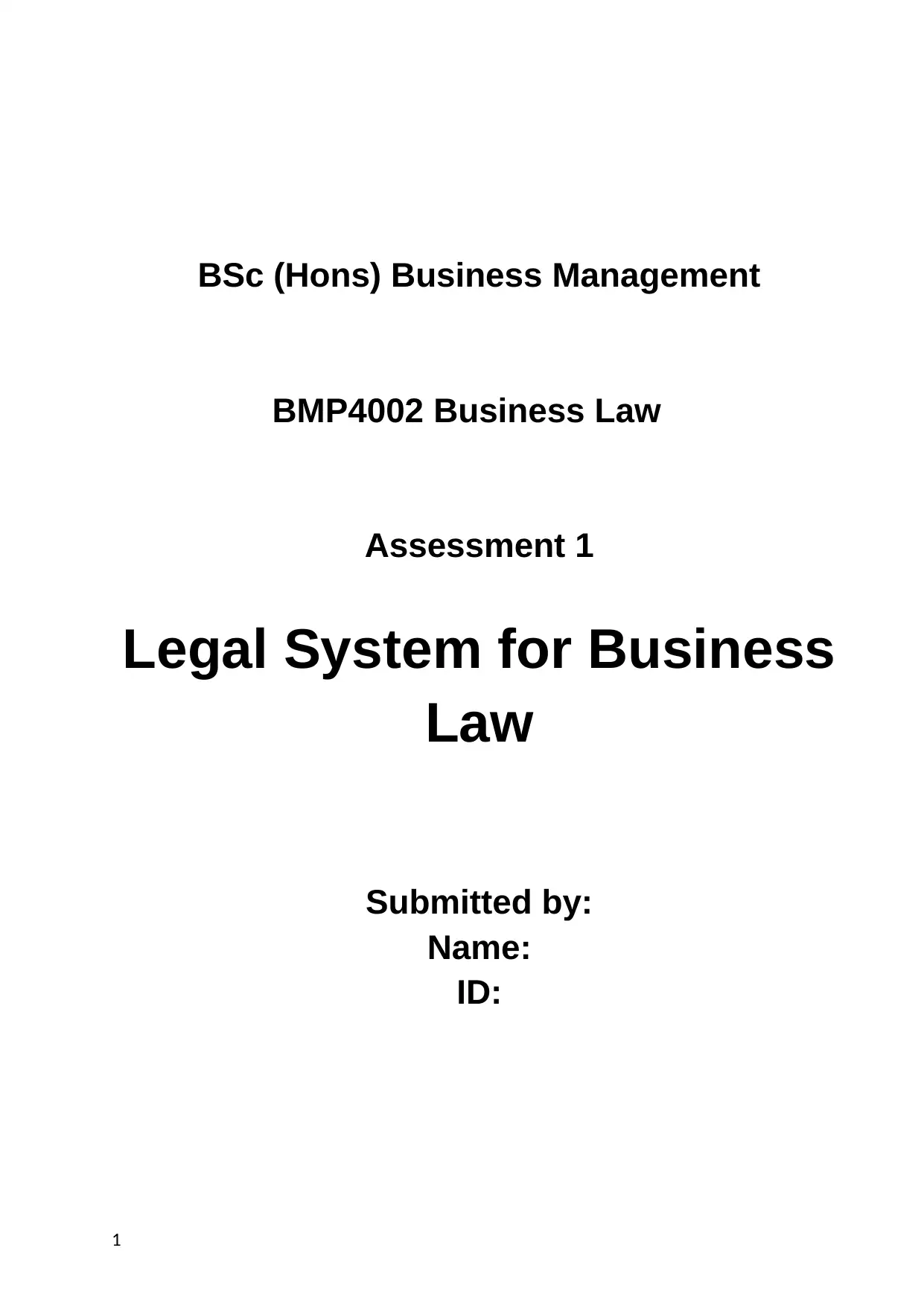
BSc (Hons) Business Management
BMP4002 Business Law
Assessment 1
Legal System for Business
Law
Submitted by:
Name:
ID:
1
BMP4002 Business Law
Assessment 1
Legal System for Business
Law
Submitted by:
Name:
ID:
1
Paraphrase This Document
Need a fresh take? Get an instant paraphrase of this document with our AI Paraphraser
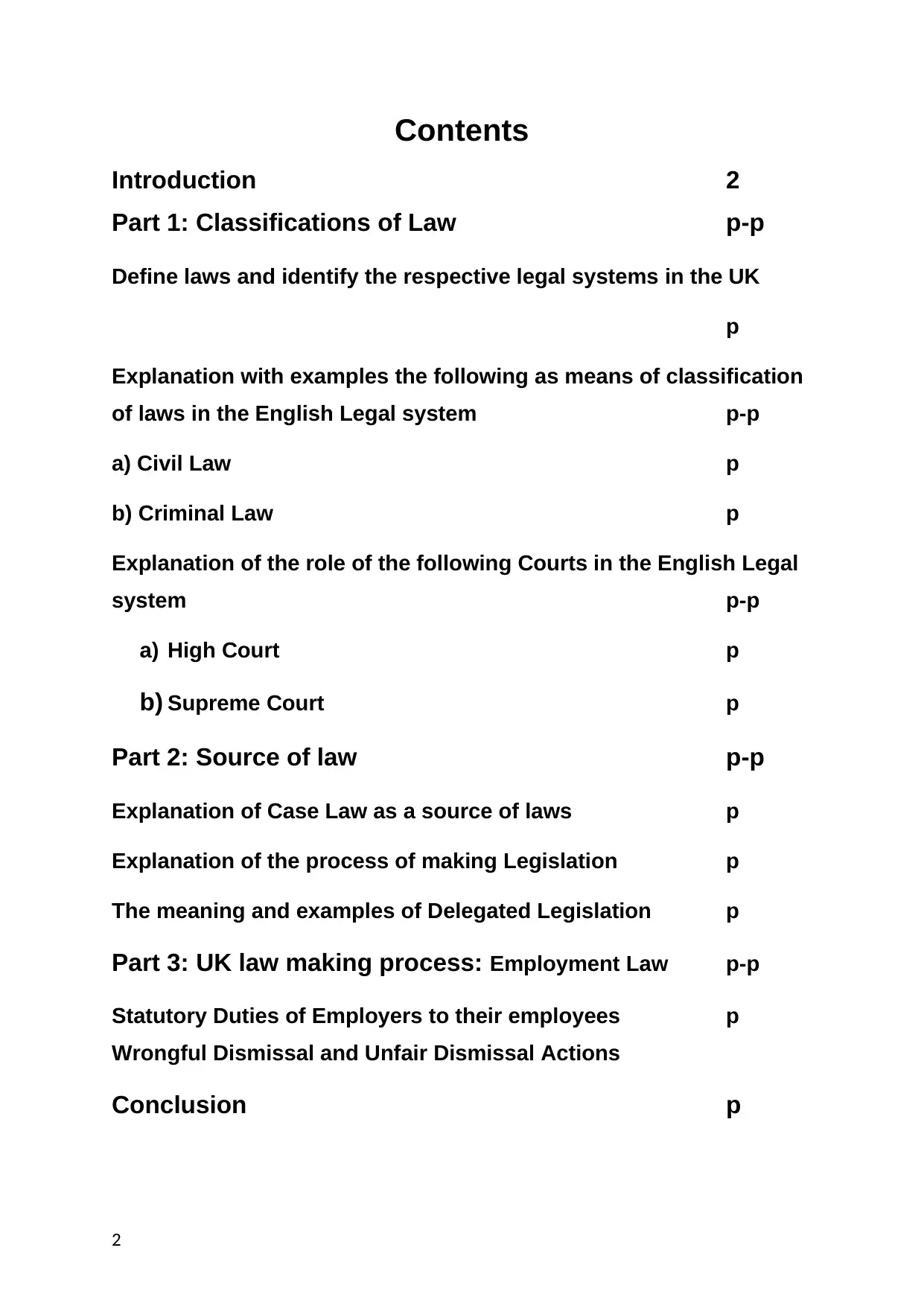
Contents
Introduction 2
Part 1: Classifications of Law p-p
Define laws and identify the respective legal systems in the UK
p
Explanation with examples the following as means of classification
of laws in the English Legal system p-p
a) Civil Law p
b) Criminal Law p
Explanation of the role of the following Courts in the English Legal
system p-p
a) High Court p
b) Supreme Court p
Part 2: Source of law p-p
Explanation of Case Law as a source of laws p
Explanation of the process of making Legislation p
The meaning and examples of Delegated Legislation p
Part 3: UK law making process: Employment Law p-p
Statutory Duties of Employers to their employees p
Wrongful Dismissal and Unfair Dismissal Actions
Conclusion p
2
Introduction 2
Part 1: Classifications of Law p-p
Define laws and identify the respective legal systems in the UK
p
Explanation with examples the following as means of classification
of laws in the English Legal system p-p
a) Civil Law p
b) Criminal Law p
Explanation of the role of the following Courts in the English Legal
system p-p
a) High Court p
b) Supreme Court p
Part 2: Source of law p-p
Explanation of Case Law as a source of laws p
Explanation of the process of making Legislation p
The meaning and examples of Delegated Legislation p
Part 3: UK law making process: Employment Law p-p
Statutory Duties of Employers to their employees p
Wrongful Dismissal and Unfair Dismissal Actions
Conclusion p
2

3
⊘ This is a preview!⊘
Do you want full access?
Subscribe today to unlock all pages.

Trusted by 1+ million students worldwide

Introduction
For the purpose of effectual governance of the law and order in the country its legal
system is the one which plays a major role. Therefore, the formulation of the said legislations
while seeing their necessity is a must task on the part of law making authorities of the country
which is the legislature. The made laws can also be amended and altered by the concerned
officials as per the needs of the new provisions and regulations in the society(Abbasi and
Parsa,2019). One of the major aim of the constitution of the laws is that by this the conduct of
both the individuals as well as the society can be governed by the mandatory implication of
the laws on them. The said report is going to elaborate the different kinds of laws along with
their process of application in the United Kingdom. The report also covers the powers and
working of higher courts of the country which is supreme court and high courts. Further the
last part of it mentions the number of statutory duties to which the every employer is bound to
comply with.
Part 1: Classifications of Law
Define laws and identify the respective legal systems in the UK
The laws are the set of rules and regulations which are implemented on the people and
other bodies of the country by the government or the other concerned official bodies creating
a binding effect on the people and stating the manner in which they need to carry out their
affairs. Further for the acts of non compliance, it also states the provisions which specifies the
legal obligations for the same in the form of punishments and fines. Moreover, the
legislations which are being resulted by the due process of the law are said to be the primary
sources of law in the country and because of this reason they tends to create a binding effect
on all the other subordinate bodies which falls under. The legislation other than their
obligations also states the number of powers and authorities which lies at the option of an
individual. Therefore the legislature must take special care of the fact, while making the laws
that the individual rights of the people does not get infringed or hampered as a result of legal
application of the newly enacted legislations. The country consists of the laws which are not
in codified from reason being they are partially written(Adams and Prassl, 2018).
Furthermore, the laws in the United Kingdom are broadly classified into two major heads
which are the common laws and the statutory laws where the former one are the result of the
decisions made by the higher courts of the country in the form of judicial precedents.
Whereas the other are said to be resulted from the due process of the law making of the
4
For the purpose of effectual governance of the law and order in the country its legal
system is the one which plays a major role. Therefore, the formulation of the said legislations
while seeing their necessity is a must task on the part of law making authorities of the country
which is the legislature. The made laws can also be amended and altered by the concerned
officials as per the needs of the new provisions and regulations in the society(Abbasi and
Parsa,2019). One of the major aim of the constitution of the laws is that by this the conduct of
both the individuals as well as the society can be governed by the mandatory implication of
the laws on them. The said report is going to elaborate the different kinds of laws along with
their process of application in the United Kingdom. The report also covers the powers and
working of higher courts of the country which is supreme court and high courts. Further the
last part of it mentions the number of statutory duties to which the every employer is bound to
comply with.
Part 1: Classifications of Law
Define laws and identify the respective legal systems in the UK
The laws are the set of rules and regulations which are implemented on the people and
other bodies of the country by the government or the other concerned official bodies creating
a binding effect on the people and stating the manner in which they need to carry out their
affairs. Further for the acts of non compliance, it also states the provisions which specifies the
legal obligations for the same in the form of punishments and fines. Moreover, the
legislations which are being resulted by the due process of the law are said to be the primary
sources of law in the country and because of this reason they tends to create a binding effect
on all the other subordinate bodies which falls under. The legislation other than their
obligations also states the number of powers and authorities which lies at the option of an
individual. Therefore the legislature must take special care of the fact, while making the laws
that the individual rights of the people does not get infringed or hampered as a result of legal
application of the newly enacted legislations. The country consists of the laws which are not
in codified from reason being they are partially written(Adams and Prassl, 2018).
Furthermore, the laws in the United Kingdom are broadly classified into two major heads
which are the common laws and the statutory laws where the former one are the result of the
decisions made by the higher courts of the country in the form of judicial precedents.
Whereas the other are said to be resulted from the due process of the law making of the
4
Paraphrase This Document
Need a fresh take? Get an instant paraphrase of this document with our AI Paraphraser
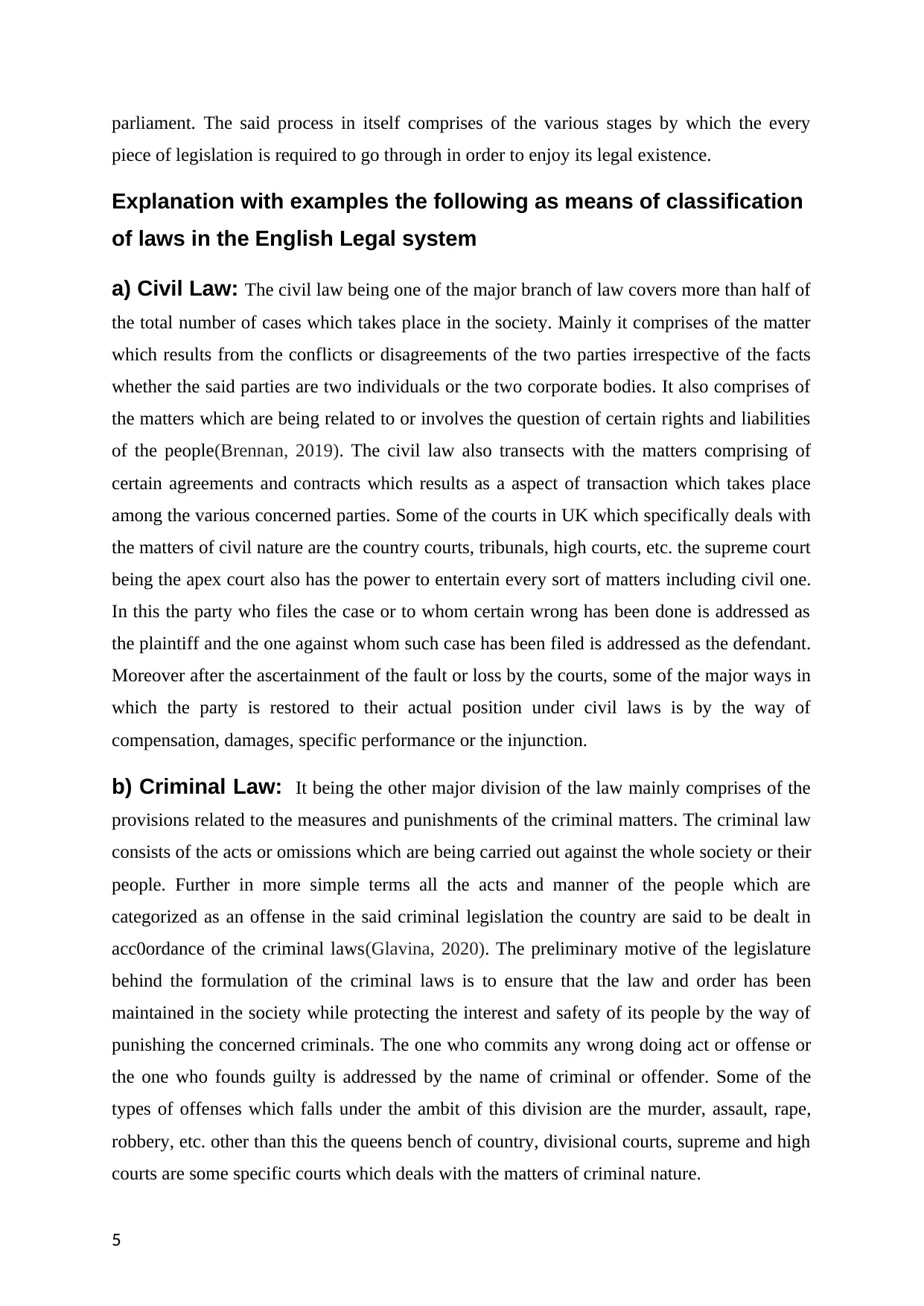
parliament. The said process in itself comprises of the various stages by which the every
piece of legislation is required to go through in order to enjoy its legal existence.
Explanation with examples the following as means of classification
of laws in the English Legal system
a) Civil Law: The civil law being one of the major branch of law covers more than half of
the total number of cases which takes place in the society. Mainly it comprises of the matter
which results from the conflicts or disagreements of the two parties irrespective of the facts
whether the said parties are two individuals or the two corporate bodies. It also comprises of
the matters which are being related to or involves the question of certain rights and liabilities
of the people(Brennan, 2019). The civil law also transects with the matters comprising of
certain agreements and contracts which results as a aspect of transaction which takes place
among the various concerned parties. Some of the courts in UK which specifically deals with
the matters of civil nature are the country courts, tribunals, high courts, etc. the supreme court
being the apex court also has the power to entertain every sort of matters including civil one.
In this the party who files the case or to whom certain wrong has been done is addressed as
the plaintiff and the one against whom such case has been filed is addressed as the defendant.
Moreover after the ascertainment of the fault or loss by the courts, some of the major ways in
which the party is restored to their actual position under civil laws is by the way of
compensation, damages, specific performance or the injunction.
b) Criminal Law: It being the other major division of the law mainly comprises of the
provisions related to the measures and punishments of the criminal matters. The criminal law
consists of the acts or omissions which are being carried out against the whole society or their
people. Further in more simple terms all the acts and manner of the people which are
categorized as an offense in the said criminal legislation the country are said to be dealt in
acc0ordance of the criminal laws(Glavina, 2020). The preliminary motive of the legislature
behind the formulation of the criminal laws is to ensure that the law and order has been
maintained in the society while protecting the interest and safety of its people by the way of
punishing the concerned criminals. The one who commits any wrong doing act or offense or
the one who founds guilty is addressed by the name of criminal or offender. Some of the
types of offenses which falls under the ambit of this division are the murder, assault, rape,
robbery, etc. other than this the queens bench of country, divisional courts, supreme and high
courts are some specific courts which deals with the matters of criminal nature.
5
piece of legislation is required to go through in order to enjoy its legal existence.
Explanation with examples the following as means of classification
of laws in the English Legal system
a) Civil Law: The civil law being one of the major branch of law covers more than half of
the total number of cases which takes place in the society. Mainly it comprises of the matter
which results from the conflicts or disagreements of the two parties irrespective of the facts
whether the said parties are two individuals or the two corporate bodies. It also comprises of
the matters which are being related to or involves the question of certain rights and liabilities
of the people(Brennan, 2019). The civil law also transects with the matters comprising of
certain agreements and contracts which results as a aspect of transaction which takes place
among the various concerned parties. Some of the courts in UK which specifically deals with
the matters of civil nature are the country courts, tribunals, high courts, etc. the supreme court
being the apex court also has the power to entertain every sort of matters including civil one.
In this the party who files the case or to whom certain wrong has been done is addressed as
the plaintiff and the one against whom such case has been filed is addressed as the defendant.
Moreover after the ascertainment of the fault or loss by the courts, some of the major ways in
which the party is restored to their actual position under civil laws is by the way of
compensation, damages, specific performance or the injunction.
b) Criminal Law: It being the other major division of the law mainly comprises of the
provisions related to the measures and punishments of the criminal matters. The criminal law
consists of the acts or omissions which are being carried out against the whole society or their
people. Further in more simple terms all the acts and manner of the people which are
categorized as an offense in the said criminal legislation the country are said to be dealt in
acc0ordance of the criminal laws(Glavina, 2020). The preliminary motive of the legislature
behind the formulation of the criminal laws is to ensure that the law and order has been
maintained in the society while protecting the interest and safety of its people by the way of
punishing the concerned criminals. The one who commits any wrong doing act or offense or
the one who founds guilty is addressed by the name of criminal or offender. Some of the
types of offenses which falls under the ambit of this division are the murder, assault, rape,
robbery, etc. other than this the queens bench of country, divisional courts, supreme and high
courts are some specific courts which deals with the matters of criminal nature.
5
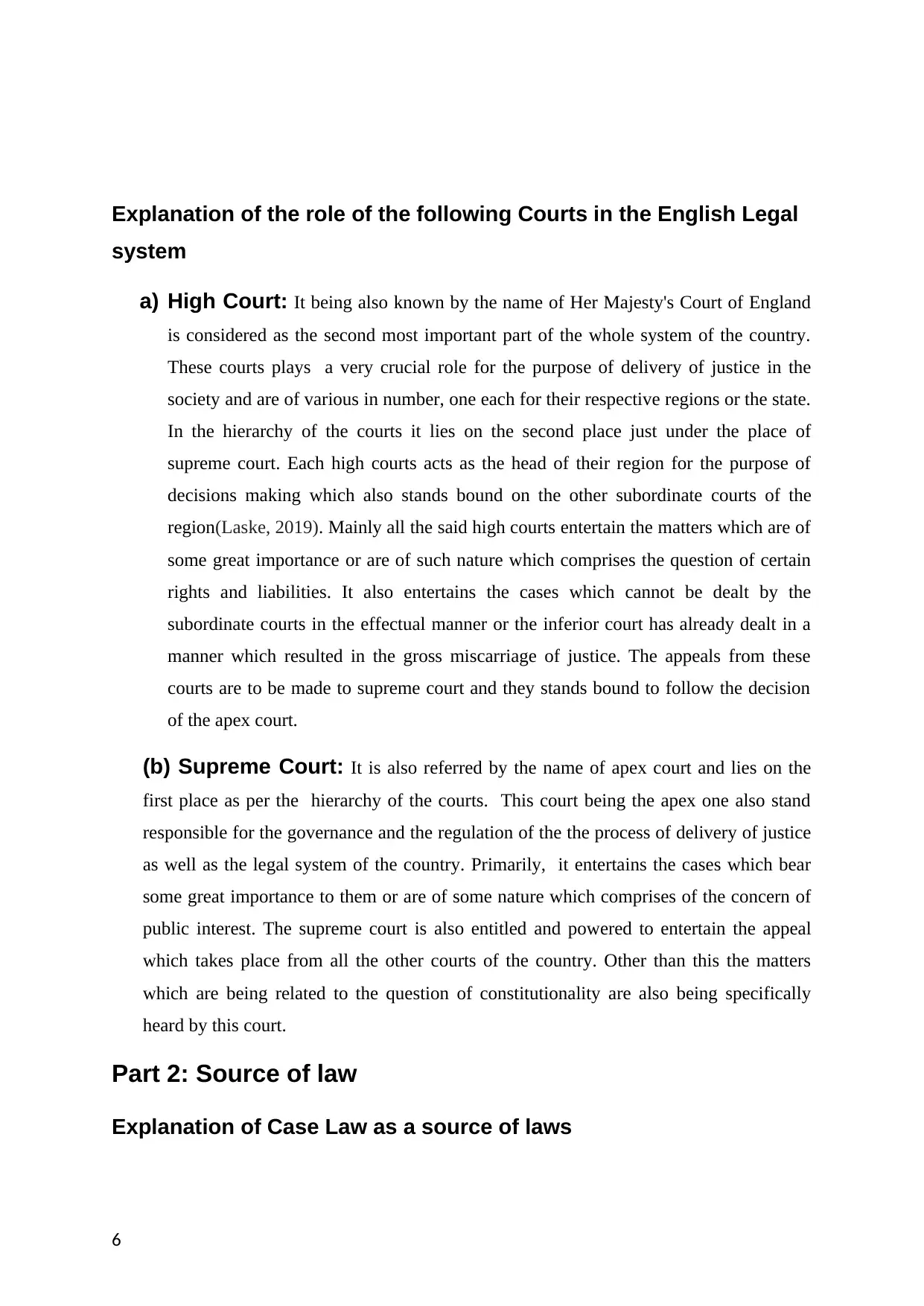
Explanation of the role of the following Courts in the English Legal
system
a) High Court: It being also known by the name of Her Majesty's Court of England
is considered as the second most important part of the whole system of the country.
These courts plays a very crucial role for the purpose of delivery of justice in the
society and are of various in number, one each for their respective regions or the state.
In the hierarchy of the courts it lies on the second place just under the place of
supreme court. Each high courts acts as the head of their region for the purpose of
decisions making which also stands bound on the other subordinate courts of the
region(Laske, 2019). Mainly all the said high courts entertain the matters which are of
some great importance or are of such nature which comprises the question of certain
rights and liabilities. It also entertains the cases which cannot be dealt by the
subordinate courts in the effectual manner or the inferior court has already dealt in a
manner which resulted in the gross miscarriage of justice. The appeals from these
courts are to be made to supreme court and they stands bound to follow the decision
of the apex court.
(b) Supreme Court: It is also referred by the name of apex court and lies on the
first place as per the hierarchy of the courts. This court being the apex one also stand
responsible for the governance and the regulation of the the process of delivery of justice
as well as the legal system of the country. Primarily, it entertains the cases which bear
some great importance to them or are of some nature which comprises of the concern of
public interest. The supreme court is also entitled and powered to entertain the appeal
which takes place from all the other courts of the country. Other than this the matters
which are being related to the question of constitutionality are also being specifically
heard by this court.
Part 2: Source of law
Explanation of Case Law as a source of laws
6
system
a) High Court: It being also known by the name of Her Majesty's Court of England
is considered as the second most important part of the whole system of the country.
These courts plays a very crucial role for the purpose of delivery of justice in the
society and are of various in number, one each for their respective regions or the state.
In the hierarchy of the courts it lies on the second place just under the place of
supreme court. Each high courts acts as the head of their region for the purpose of
decisions making which also stands bound on the other subordinate courts of the
region(Laske, 2019). Mainly all the said high courts entertain the matters which are of
some great importance or are of such nature which comprises the question of certain
rights and liabilities. It also entertains the cases which cannot be dealt by the
subordinate courts in the effectual manner or the inferior court has already dealt in a
manner which resulted in the gross miscarriage of justice. The appeals from these
courts are to be made to supreme court and they stands bound to follow the decision
of the apex court.
(b) Supreme Court: It is also referred by the name of apex court and lies on the
first place as per the hierarchy of the courts. This court being the apex one also stand
responsible for the governance and the regulation of the the process of delivery of justice
as well as the legal system of the country. Primarily, it entertains the cases which bear
some great importance to them or are of some nature which comprises of the concern of
public interest. The supreme court is also entitled and powered to entertain the appeal
which takes place from all the other courts of the country. Other than this the matters
which are being related to the question of constitutionality are also being specifically
heard by this court.
Part 2: Source of law
Explanation of Case Law as a source of laws
6
⊘ This is a preview!⊘
Do you want full access?
Subscribe today to unlock all pages.

Trusted by 1+ million students worldwide
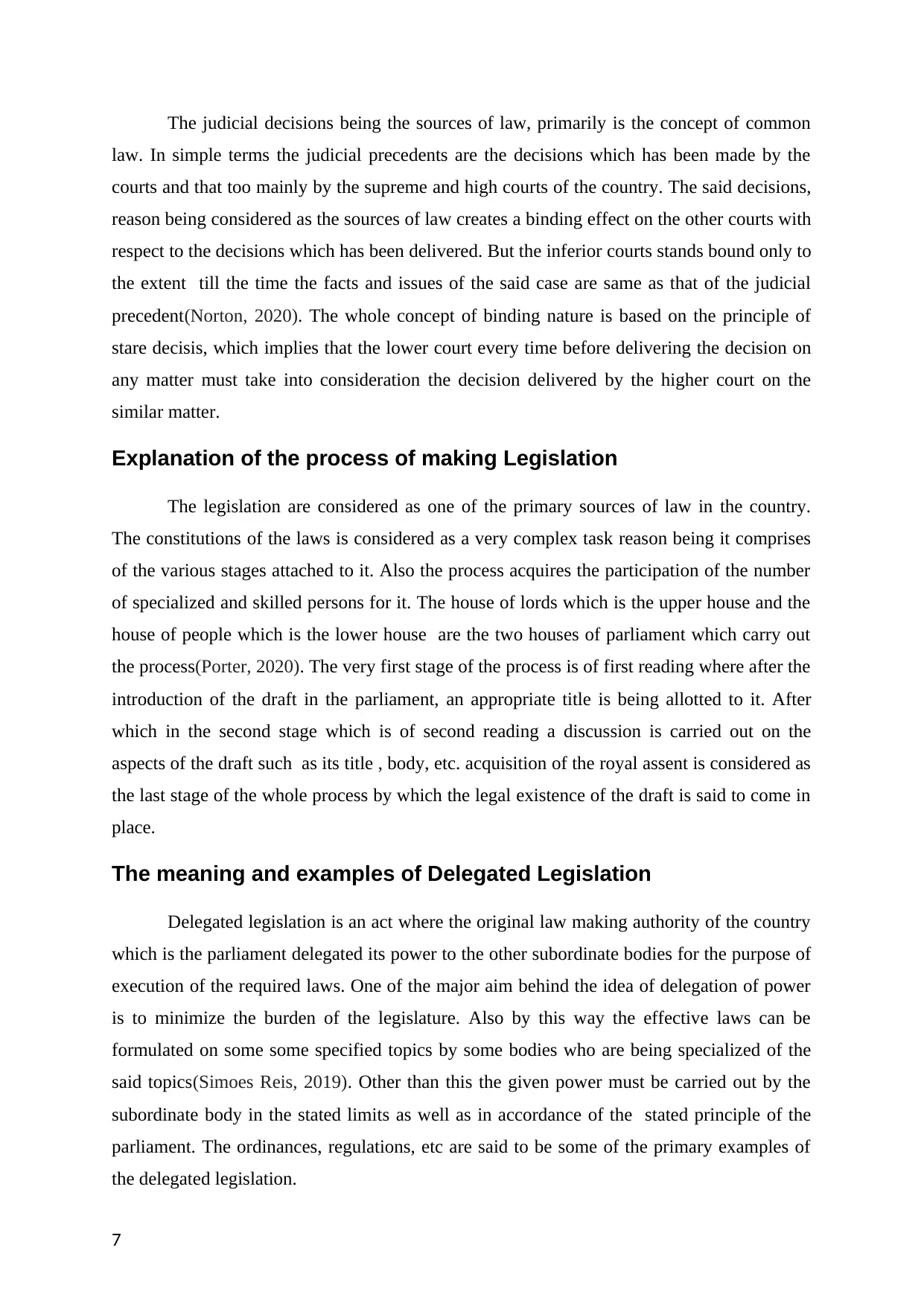
The judicial decisions being the sources of law, primarily is the concept of common
law. In simple terms the judicial precedents are the decisions which has been made by the
courts and that too mainly by the supreme and high courts of the country. The said decisions,
reason being considered as the sources of law creates a binding effect on the other courts with
respect to the decisions which has been delivered. But the inferior courts stands bound only to
the extent till the time the facts and issues of the said case are same as that of the judicial
precedent(Norton, 2020). The whole concept of binding nature is based on the principle of
stare decisis, which implies that the lower court every time before delivering the decision on
any matter must take into consideration the decision delivered by the higher court on the
similar matter.
Explanation of the process of making Legislation
The legislation are considered as one of the primary sources of law in the country.
The constitutions of the laws is considered as a very complex task reason being it comprises
of the various stages attached to it. Also the process acquires the participation of the number
of specialized and skilled persons for it. The house of lords which is the upper house and the
house of people which is the lower house are the two houses of parliament which carry out
the process(Porter, 2020). The very first stage of the process is of first reading where after the
introduction of the draft in the parliament, an appropriate title is being allotted to it. After
which in the second stage which is of second reading a discussion is carried out on the
aspects of the draft such as its title , body, etc. acquisition of the royal assent is considered as
the last stage of the whole process by which the legal existence of the draft is said to come in
place.
The meaning and examples of Delegated Legislation
Delegated legislation is an act where the original law making authority of the country
which is the parliament delegated its power to the other subordinate bodies for the purpose of
execution of the required laws. One of the major aim behind the idea of delegation of power
is to minimize the burden of the legislature. Also by this way the effective laws can be
formulated on some some specified topics by some bodies who are being specialized of the
said topics(Simoes Reis, 2019). Other than this the given power must be carried out by the
subordinate body in the stated limits as well as in accordance of the stated principle of the
parliament. The ordinances, regulations, etc are said to be some of the primary examples of
the delegated legislation.
7
law. In simple terms the judicial precedents are the decisions which has been made by the
courts and that too mainly by the supreme and high courts of the country. The said decisions,
reason being considered as the sources of law creates a binding effect on the other courts with
respect to the decisions which has been delivered. But the inferior courts stands bound only to
the extent till the time the facts and issues of the said case are same as that of the judicial
precedent(Norton, 2020). The whole concept of binding nature is based on the principle of
stare decisis, which implies that the lower court every time before delivering the decision on
any matter must take into consideration the decision delivered by the higher court on the
similar matter.
Explanation of the process of making Legislation
The legislation are considered as one of the primary sources of law in the country.
The constitutions of the laws is considered as a very complex task reason being it comprises
of the various stages attached to it. Also the process acquires the participation of the number
of specialized and skilled persons for it. The house of lords which is the upper house and the
house of people which is the lower house are the two houses of parliament which carry out
the process(Porter, 2020). The very first stage of the process is of first reading where after the
introduction of the draft in the parliament, an appropriate title is being allotted to it. After
which in the second stage which is of second reading a discussion is carried out on the
aspects of the draft such as its title , body, etc. acquisition of the royal assent is considered as
the last stage of the whole process by which the legal existence of the draft is said to come in
place.
The meaning and examples of Delegated Legislation
Delegated legislation is an act where the original law making authority of the country
which is the parliament delegated its power to the other subordinate bodies for the purpose of
execution of the required laws. One of the major aim behind the idea of delegation of power
is to minimize the burden of the legislature. Also by this way the effective laws can be
formulated on some some specified topics by some bodies who are being specialized of the
said topics(Simoes Reis, 2019). Other than this the given power must be carried out by the
subordinate body in the stated limits as well as in accordance of the stated principle of the
parliament. The ordinances, regulations, etc are said to be some of the primary examples of
the delegated legislation.
7
Paraphrase This Document
Need a fresh take? Get an instant paraphrase of this document with our AI Paraphraser
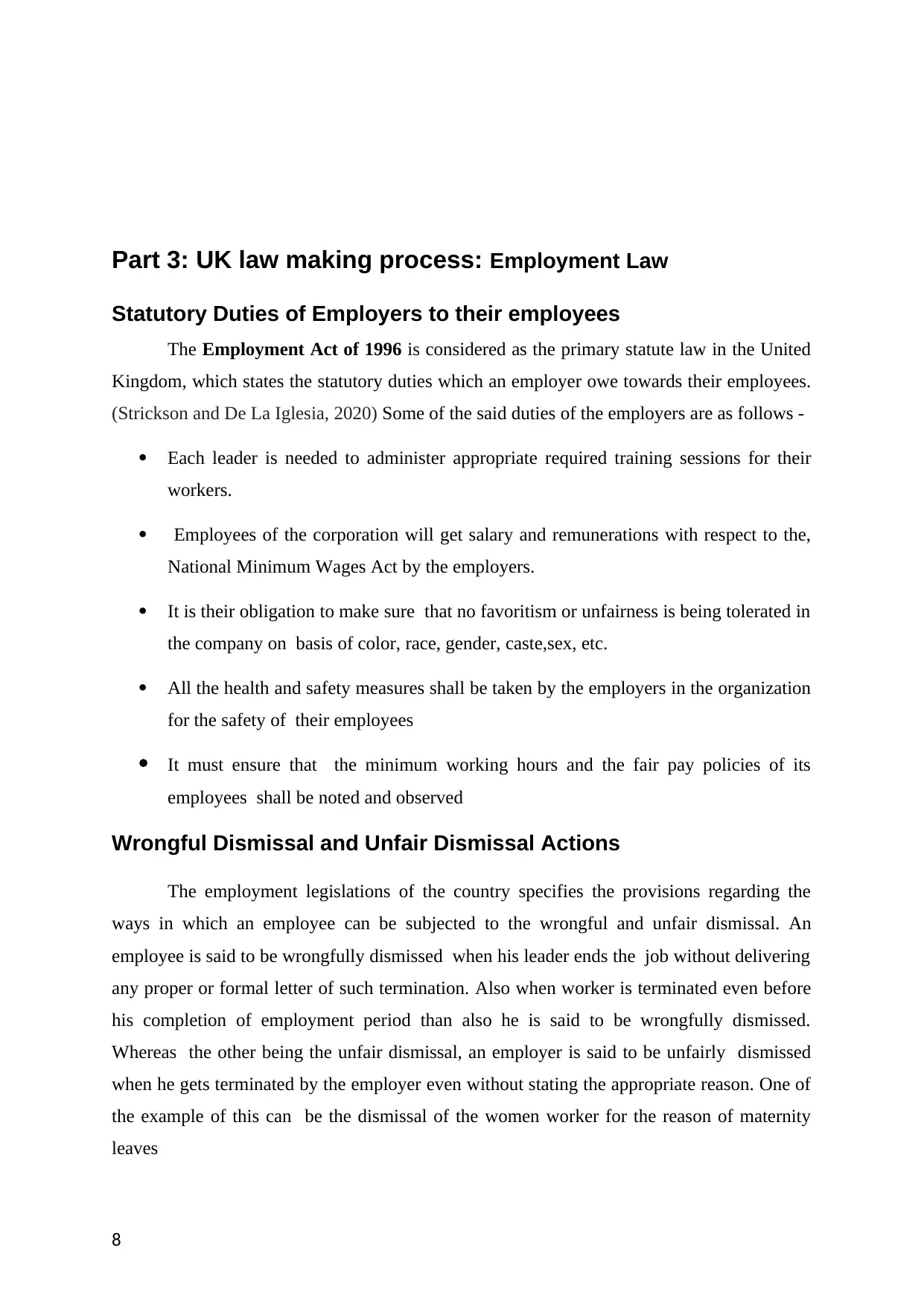
Part 3: UK law making process: Employment Law
Statutory Duties of Employers to their employees
The Employment Act of 1996 is considered as the primary statute law in the United
Kingdom, which states the statutory duties which an employer owe towards their employees.
(Strickson and De La Iglesia, 2020) Some of the said duties of the employers are as follows -
Each leader is needed to administer appropriate required training sessions for their
workers.
Employees of the corporation will get salary and remunerations with respect to the,
National Minimum Wages Act by the employers.
It is their obligation to make sure that no favoritism or unfairness is being tolerated in
the company on basis of color, race, gender, caste,sex, etc.
All the health and safety measures shall be taken by the employers in the organization
for the safety of their employees
It must ensure that the minimum working hours and the fair pay policies of its
employees shall be noted and observed
Wrongful Dismissal and Unfair Dismissal Actions
The employment legislations of the country specifies the provisions regarding the
ways in which an employee can be subjected to the wrongful and unfair dismissal. An
employee is said to be wrongfully dismissed when his leader ends the job without delivering
any proper or formal letter of such termination. Also when worker is terminated even before
his completion of employment period than also he is said to be wrongfully dismissed.
Whereas the other being the unfair dismissal, an employer is said to be unfairly dismissed
when he gets terminated by the employer even without stating the appropriate reason. One of
the example of this can be the dismissal of the women worker for the reason of maternity
leaves
8
Statutory Duties of Employers to their employees
The Employment Act of 1996 is considered as the primary statute law in the United
Kingdom, which states the statutory duties which an employer owe towards their employees.
(Strickson and De La Iglesia, 2020) Some of the said duties of the employers are as follows -
Each leader is needed to administer appropriate required training sessions for their
workers.
Employees of the corporation will get salary and remunerations with respect to the,
National Minimum Wages Act by the employers.
It is their obligation to make sure that no favoritism or unfairness is being tolerated in
the company on basis of color, race, gender, caste,sex, etc.
All the health and safety measures shall be taken by the employers in the organization
for the safety of their employees
It must ensure that the minimum working hours and the fair pay policies of its
employees shall be noted and observed
Wrongful Dismissal and Unfair Dismissal Actions
The employment legislations of the country specifies the provisions regarding the
ways in which an employee can be subjected to the wrongful and unfair dismissal. An
employee is said to be wrongfully dismissed when his leader ends the job without delivering
any proper or formal letter of such termination. Also when worker is terminated even before
his completion of employment period than also he is said to be wrongfully dismissed.
Whereas the other being the unfair dismissal, an employer is said to be unfairly dismissed
when he gets terminated by the employer even without stating the appropriate reason. One of
the example of this can be the dismissal of the women worker for the reason of maternity
leaves
8
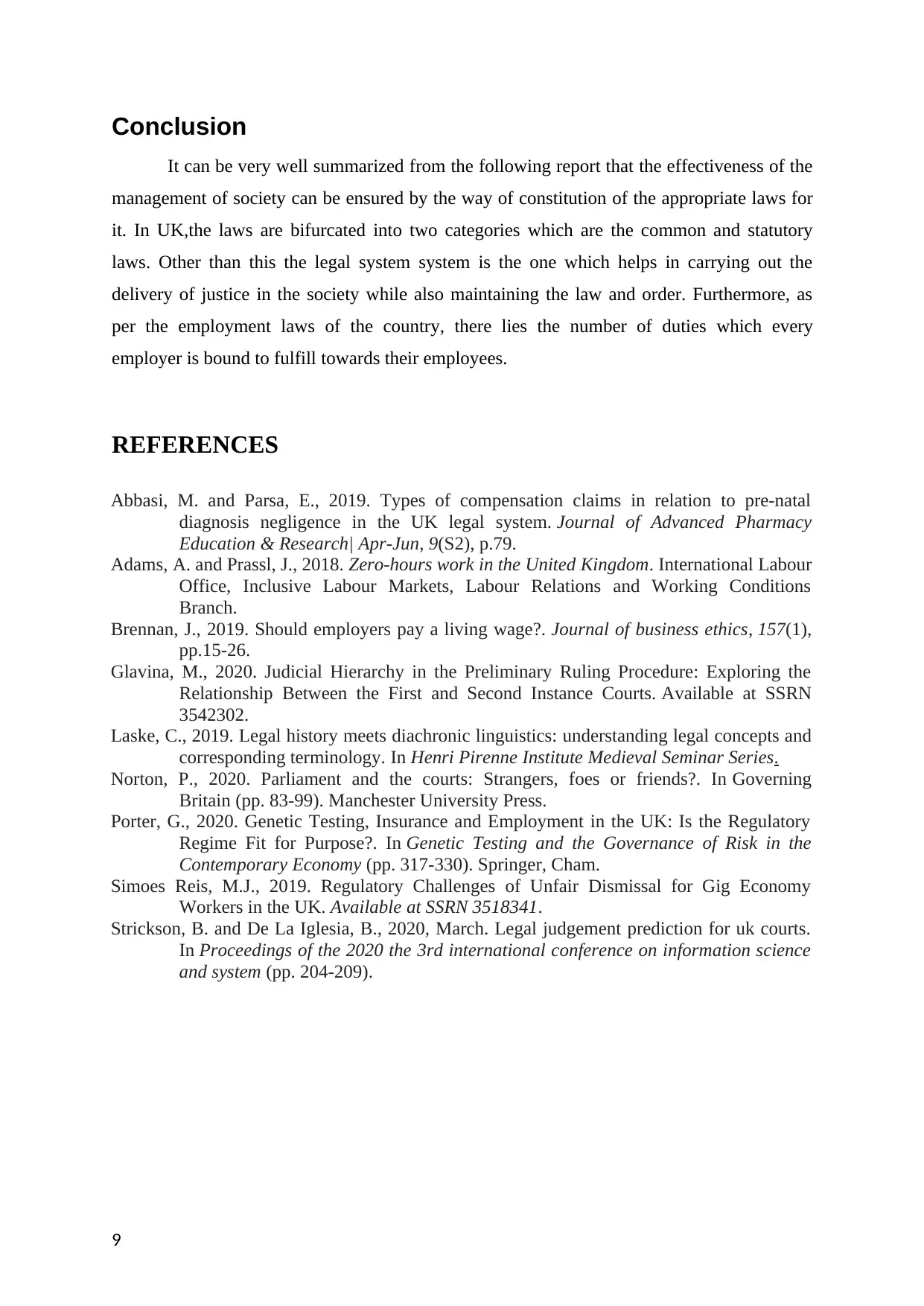
Conclusion
It can be very well summarized from the following report that the effectiveness of the
management of society can be ensured by the way of constitution of the appropriate laws for
it. In UK,the laws are bifurcated into two categories which are the common and statutory
laws. Other than this the legal system system is the one which helps in carrying out the
delivery of justice in the society while also maintaining the law and order. Furthermore, as
per the employment laws of the country, there lies the number of duties which every
employer is bound to fulfill towards their employees.
REFERENCES
Abbasi, M. and Parsa, E., 2019. Types of compensation claims in relation to pre-natal
diagnosis negligence in the UK legal system. Journal of Advanced Pharmacy
Education & Research| Apr-Jun, 9(S2), p.79.
Adams, A. and Prassl, J., 2018. Zero-hours work in the United Kingdom. International Labour
Office, Inclusive Labour Markets, Labour Relations and Working Conditions
Branch.
Brennan, J., 2019. Should employers pay a living wage?. Journal of business ethics, 157(1),
pp.15-26.
Glavina, M., 2020. Judicial Hierarchy in the Preliminary Ruling Procedure: Exploring the
Relationship Between the First and Second Instance Courts. Available at SSRN
3542302.
Laske, C., 2019. Legal history meets diachronic linguistics: understanding legal concepts and
corresponding terminology. In Henri Pirenne Institute Medieval Seminar Series.
Norton, P., 2020. Parliament and the courts: Strangers, foes or friends?. In Governing
Britain (pp. 83-99). Manchester University Press.
Porter, G., 2020. Genetic Testing, Insurance and Employment in the UK: Is the Regulatory
Regime Fit for Purpose?. In Genetic Testing and the Governance of Risk in the
Contemporary Economy (pp. 317-330). Springer, Cham.
Simoes Reis, M.J., 2019. Regulatory Challenges of Unfair Dismissal for Gig Economy
Workers in the UK. Available at SSRN 3518341.
Strickson, B. and De La Iglesia, B., 2020, March. Legal judgement prediction for uk courts.
In Proceedings of the 2020 the 3rd international conference on information science
and system (pp. 204-209).
9
It can be very well summarized from the following report that the effectiveness of the
management of society can be ensured by the way of constitution of the appropriate laws for
it. In UK,the laws are bifurcated into two categories which are the common and statutory
laws. Other than this the legal system system is the one which helps in carrying out the
delivery of justice in the society while also maintaining the law and order. Furthermore, as
per the employment laws of the country, there lies the number of duties which every
employer is bound to fulfill towards their employees.
REFERENCES
Abbasi, M. and Parsa, E., 2019. Types of compensation claims in relation to pre-natal
diagnosis negligence in the UK legal system. Journal of Advanced Pharmacy
Education & Research| Apr-Jun, 9(S2), p.79.
Adams, A. and Prassl, J., 2018. Zero-hours work in the United Kingdom. International Labour
Office, Inclusive Labour Markets, Labour Relations and Working Conditions
Branch.
Brennan, J., 2019. Should employers pay a living wage?. Journal of business ethics, 157(1),
pp.15-26.
Glavina, M., 2020. Judicial Hierarchy in the Preliminary Ruling Procedure: Exploring the
Relationship Between the First and Second Instance Courts. Available at SSRN
3542302.
Laske, C., 2019. Legal history meets diachronic linguistics: understanding legal concepts and
corresponding terminology. In Henri Pirenne Institute Medieval Seminar Series.
Norton, P., 2020. Parliament and the courts: Strangers, foes or friends?. In Governing
Britain (pp. 83-99). Manchester University Press.
Porter, G., 2020. Genetic Testing, Insurance and Employment in the UK: Is the Regulatory
Regime Fit for Purpose?. In Genetic Testing and the Governance of Risk in the
Contemporary Economy (pp. 317-330). Springer, Cham.
Simoes Reis, M.J., 2019. Regulatory Challenges of Unfair Dismissal for Gig Economy
Workers in the UK. Available at SSRN 3518341.
Strickson, B. and De La Iglesia, B., 2020, March. Legal judgement prediction for uk courts.
In Proceedings of the 2020 the 3rd international conference on information science
and system (pp. 204-209).
9
⊘ This is a preview!⊘
Do you want full access?
Subscribe today to unlock all pages.

Trusted by 1+ million students worldwide

10
1 out of 10
Related Documents
Your All-in-One AI-Powered Toolkit for Academic Success.
+13062052269
info@desklib.com
Available 24*7 on WhatsApp / Email
![[object Object]](/_next/static/media/star-bottom.7253800d.svg)
Unlock your academic potential
Copyright © 2020–2025 A2Z Services. All Rights Reserved. Developed and managed by ZUCOL.

